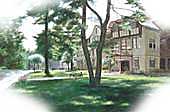Spring
1978
Called to Serve
Preston Snowman
Teacher at Pinecrest
Many people have little conception of the true function of
Bible schools in their relationship to the possible ministry
of those who attend them. Students who return to visit their
home churches after a few months at school are often expected
to have been transformed to such an extent that they suddenly
become capable of almost any type of ministry. And the student,
sensing this expectation, may come under some degree of self-condemnation
because of the consciousness of what his limitation actually
are. There are, of course, many exceptions to these general
statements, and particular cases must be evaluated as they
are found to be. However, the following four guidelines may
provide some possible help in promoting better attitudes where
they are needed.
1. No school can provide a “call” to the ministry
for anyone. Only the Lord Himself can do that, although obviously
a student may become aware of such a call before, during,
or after Bible school. Somehow the idea persists that anyone
graduating from a Bible school ought to enter “full
time ministry,” but in actuality, every true follower
of Christ is “full time.” “For now hath
God set the members every one of them in the body as it hath
pleased him” (I Corinthians 12:18).
2. It nevertheless follows from this that it can be exceedingly
profitable to attend a Bible school, even those who have no
intention of “entering the ministry.” There is
no better atmosphere and surrounding in which to help establish
a firm foundation in the faith than a school that is sound
in faith and vision for these last days. Churches everywhere
need workers, teachers, elders, and consecrated local wage
earners to assist in the upbuilding of Christ’s kingdom.
Every such institution ought first of all to teach students
that “Whatsoever they do in word or deed, to do all
to the glory of God.” People called of God in the Scriptures
were usually busily occupied at something. It often takes
a few years of faithful, humble service to prove ourselves
before the Lord moves us into the field of His ultimate call.
3. Bible school graduates should therefore be allowed to “be
themselves” in fulfilling their work and ministry, and
not necessarily be “pressured” into some project
that seems appropriate. Above all, they must hear from God
for themselves. If we have not learned to do that in the lesser
things, then how effective will our ministry be in a wider
area?
4. This fourth suggestion is very important and concerns the
attitude of the student himself. He must be careful in to
seeking to impose upon his home church new view points or
methods, without proper consideration. Sometimes students
go home “all fired up,” and seek to bring in overnight
a new order in their local group. If anyone has a type of
ministry that will help others, wisdom from on High must be
sought as to how best it may be shared. Sometimes it is done
by humble example. At other times by private consultation
with the leadership. Often the Spirit will indicate a combination
of different methods. But there will always be the need for
earnest prayer, along with humility and loving submission.
These are factors through which the Holy Spirit can most effectively
manifest light.
“Finally, be ye all of one mind, having compassion
one of another, love as brethren, be pitiful, be courteous;
not rendering evil for evil, or railing for railing, but contrariwise
blessing, knowing that ye are thereunto called, that ye should
inherit a blessing.” I Peter 3:8, 9


